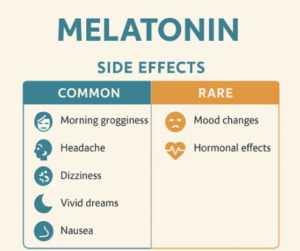Side Effects and Drug Interactions of Melatonin: What You Need to Know
 Melatonin is often marketed as the “natural” sleep solution, and compared with many prescription sedatives, it’s relatively safe. But “natural” doesn’t mean “side effect–free.” Like any biologically active substance, melatonin can cause unwanted effects and interact with other medications.
Melatonin is often marketed as the “natural” sleep solution, and compared with many prescription sedatives, it’s relatively safe. But “natural” doesn’t mean “side effect–free.” Like any biologically active substance, melatonin can cause unwanted effects and interact with other medications.
Common Side Effects of Melatonin
Most people tolerate melatonin well, but even at standard doses (1–5 mg), some may experience:
-
Morning grogginess (“melatonin hangover”): Especially with higher doses or late-night intake.
-
Headache: Mild but noticeable in some users.
-
Dizziness or lightheadedness: Usually dose-related.
-
Vivid dreams or nightmares: Linked to REM sleep modulation.
-
Nausea or stomach cramps: GI upset can occur, especially with higher doses or poor-quality formulations.
Less Common but Reported Side Effects
-
Mood changes: Irritability, mild anxiety, or low mood in sensitive individuals.
-
Hormonal effects: Because melatonin interacts with reproductive hormones, some studies suggest possible effects on menstrual cycles or fertility (though evidence is mixed).
-
Blood pressure fluctuations: Rarely, melatonin can lower blood pressure.
-
Allergic reactions: Uncommon, but rash or itching has been noted.
Special Populations
-
Children: Long-term safety data is limited. Concerns exist about potential effects on puberty, though evidence so far is inconclusive.
-
Pregnancy & breastfeeding: Not enough safety data; generally avoided unless prescribed.
-
Older adults: More sensitive to side effects like morning grogginess and dizziness, which can increase fall risk.
Drug Interactions: Exhaustive Breakdown
1. Blood Thinners (Anticoagulants/Antiplatelets)
-
Examples: Warfarin, Heparin, Aspirin, Clopidogrel
-
Risk: Melatonin may increase bleeding risk.
2. Immunosuppressants
-
Examples: Cyclosporine, Tacrolimus
-
Risk: Melatonin can stimulate the immune system, potentially reducing drug effectiveness in transplant patients.
3. Diabetes Medications / Insulin
-
Risk: Melatonin may affect blood sugar regulation, leading to higher or lower glucose levels. Caution in diabetic patients.
4. Antihypertensive Drugs
-
Examples: Beta-blockers (metoprolol, propranolol), ACE inhibitors, calcium channel blockers
-
Risk: Mixed. Melatonin may reduce nighttime blood pressure, but beta-blockers may lower natural melatonin levels. Supplementation may offset that, but dosing needs caution.
5. CNS Depressants (Sedatives, Hypnotics, Alcohol)
-
Examples: Benzodiazepines (diazepam, lorazepam), Z-drugs (zolpidem), opioids, alcohol
-
Risk: Additive drowsiness, impaired coordination, increased risk of falls.
6. Antidepressants
-
SSRIs (fluoxetine, sertraline), TCAs, MAOIs
-
Risk: Some may increase melatonin levels or cause additive sedation. Fluvoxamine strongly increases melatonin bioavailability.
7. Contraceptives (Oral Estrogens)
-
Risk: Estrogens may increase melatonin levels, raising the chance of side effects.
8. Steroids and Anti-inflammatory Drugs
-
Examples: Prednisone, dexamethasone
-
Risk: May reduce melatonin’s effectiveness, since steroids mimic stress hormones that oppose melatonin’s sleep-promoting effects.
9. Caffeine
-
Risk: Caffeine can blunt melatonin’s sleep-inducing effect if consumed late in the day.
10. Other Herbal Supplements
-
Examples: St. John’s Wort, Kava, Valerian
-
Risk: Additive sedation, unpredictable effects when combined.
Practical Safety Tips
-
Start low, go slow: Begin with the smallest effective dose.
-
Timing matters: Take 30–90 minutes before intended bedtime.
-
Check interactions: Especially if on blood thinners, immunosuppressants, or psychiatric meds.
-
Medical supervision: Essential for children, pregnant women, older adults, and patients with chronic medical conditions.
Bottom Line
Melatonin is safer than many sleep medications, but it’s not completely benign. Side effects are usually mild, but drug interactions can be clinically significant. If you’re on other medications, always discuss melatonin use with a healthcare provider.
About the Author
I’m Dr. Srinivas Rajkumar T, MD (AIIMS, New Delhi), Consultant Psychiatrist based in Chennai. Through my clinical practice and writing, I aim to make psychiatry more understandable and less intimidating.
📍 Mind and Memory Clinic, Apollo Clinic, Velachery, Chennai (Opp. Phoenix Mall)
📞 +91 85951 55808
🌐 srinivasaiims.com